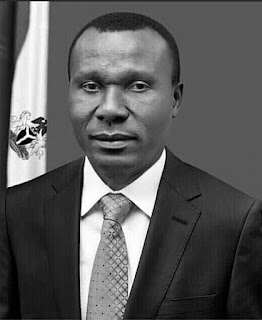THE NIGER DELTA AND THE PARADOX OF DEVELOPMENT
I once sat down and listened to the former Governor of the Central Bank of Nigeria, His Eminence Sanusi Lamido Sanusi, Emir of Kano, as he gave an allegory of "a man who died". From him I understood that there is a variation in what we inquire when we say "The Man has died" and when we say "The Man's neck was slit with a knife". When we say "a man dies" the import of the statement is much different compared to when we say "a man's throat was slit with a knife". While it is true that the man died, that is not enough because it hides too much information. The questions of; WHO killed him? WHAT sharp object was used to slit his throat? WHEN did this happen? HOW did this happen? are fundamental questions of philosophical significance we must not shy from.
The Nigerian economy was certainly dying; that goes without saying. But the questions we are most often not comfortable with are; WHO killed it? WHAT was used to kill it? WHEN did this happen? HOW did it happen? If we cool down to carefully answer this questions, conscientiously, we will know where our problems are coming from.
For example, when Usani Uguru Usani assumed duty as the Honourable Minister of Niger Delta Affairs in November 2015, there were several unanswered questions that confronted him. He practically asked pertinent question that needed to be answered immediately. The questions were not only piercing the soul, but strangulating, because there was no how he was going to set to work until he got answers.
While he familarised himself with the terrain of the Ministry and the human resources he is supposed to ĺ, he assembled a group of individuals, cut from various ethnic groups in Nigeria, to join him to physically move to every single project site (embarked upon by the Ministry, form inception to date) to assess their status vis-á-vis what was on the paper domiciled in the various departments in the Ministry. The results that emerged will almost drive a right thinking man mad; to say the least.
After the technical audit it was discovered that within the duration of September 10, 2008 to November 2015 the following had occured;
(1) Over N700bn had been budgeted for 427 projects.
(2) N421 billion on the had already been spent on these projects, leaving them at several levels of completion.
(3) At the time of the report, 12% of these projects had reached completion stage, but not commissioned, 18% of these projects were stalled and over 70% were undergoing construction.
(4) With money disbursed so far, the remaining N279bn was never going to complete all projects under construction, as the Ministry needed between N800bn and N1Tr to complete these projects due to the complexities that has arisen in the course of project abandonment and delay in completion.
(4) Impact of these projects on the lives of the people of the region was just 8%; with road construction taking 87% of the budget, Training/human capital development taking 0.87%, Conservation and Development of Coastal Ecosystem 0.03%, Water Scheme 0.32%, Rehabilitation and Remediation of Oil Impacted sites 0.16%, Skill Acquisition Centers 4.39%, Consultancy 2.13%, Food and Cassava Processing Plants 0.18%, Electrification 0.34%, Canalization 0.86% and Housing Scheme 1.05%.
(5) There was consistent duplication of projects by the Ministry of Niger Delta Affairs (MNDA), the Niger Delta Development Commission (NDDC), the Presidential Amnesty Programme (PAP), and the various State Governments in the region; with project duplication between the MNDA and the NDDC being 98%, with the Amnesty Programm 90%, and with the State Govenment programmes 85%. This revealed that there was lack of harmonization in the prioritization of projects between these entities, so as to collectively develop the region from different fronts. This was costing the government and impunging on development.
(6) In terms of capital project distribution on State basis, Rivers State got 43% (184 projects), Delta 26% (111 projects), Akwa Ibom 7% (30 projects), Abia 7% (30 projects), Imo 6% (26 projects), Bayelsa 3% (13 projects), Ondo 4% (17 projects), Edo 2% (8 projects) and Cross River 2% (8 projects).
This is the reason the Niger Delta regional economy drags in the mud, despite the huge amount of money in circulation. With these analysis, we can see why there is profound infrastructure decay and poor human development in the region. It is, thus, clear that the Niger Delta was not just dying, but its throat has been slit. Rather than ask who slit the throat, an overwhelming segment of the Nigerian public space is only consumed by the shallow fact that "the region is dying" and "Nigeria is dying". Thus is the paradox of our mindset.
These incontrovertible facts are from just the Ministry of Niger Delta Affairs whose cumulative budgetary allocation, from inception to date, is not up to N800bn, and releases not up to N500bn, cumulatively. How much more the Niger Delta Development Commission (NDDC) whose cumulative budgetary allocation is well over N2.5tr, from inception till date, not to talk of the Presidential Amnesty Programme. A technical audit of all agencies working in the region will show deeper reasons why our country, while gloating over the modest progress as the largest economy on African soil (which is principally due to its volume of cash) was at the brink of economic collapse in the advent of the Buhari-government.
This revelation has given the current national government a compass on how to rewrite the Niger Delta narrative.
The Herculean task of WHAT the government is doing, HOW and WHY it is doing what it is doing, to tackle the deep-rooted challenges that stare us in the face (even beyond the scope of the Niger Delta region, are questions I will certainly answer in due course.


Comments
Post a Comment